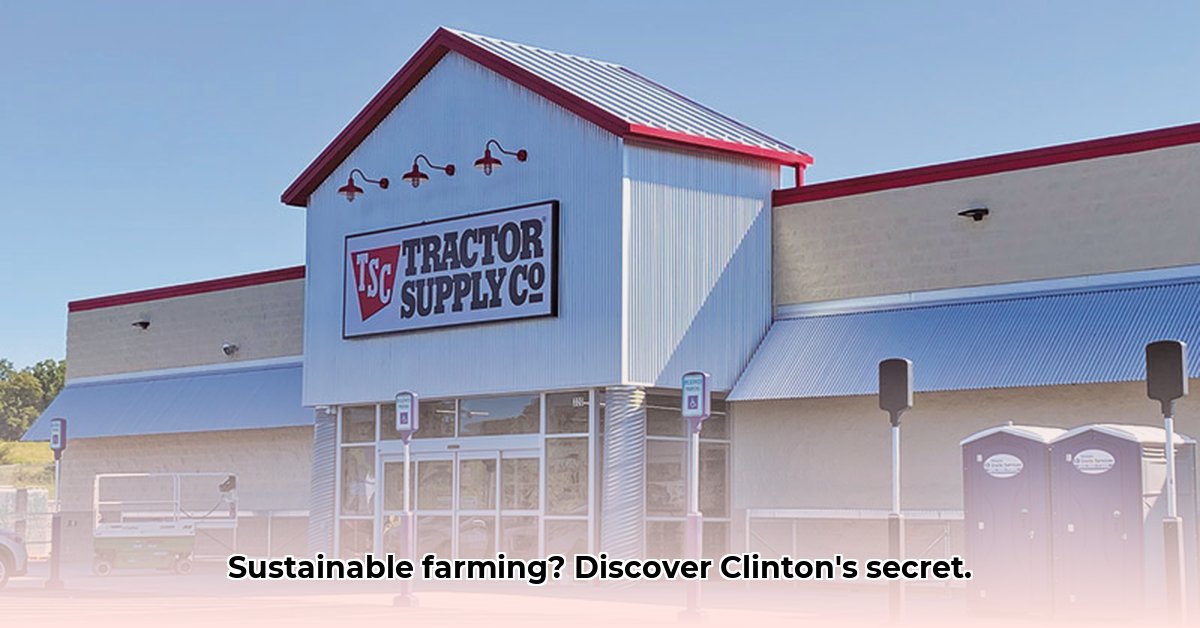
Tractor Supply Company (TSC) in Clinton, Missouri, plays a significant role in the local agricultural community. This article examines its contribution to sustainable farming practices, highlighting both its strengths and areas needing improvement. We'll explore its current offerings, identify gaps in its sustainability initiatives, and propose actionable steps for a greener future. Ultimately, we aim to understand how TSC can better serve the needs of environmentally conscious farmers and gardeners in Clinton. For examples of similar initiatives, see this TSC store example.
TSC's Current Offerings for Sustainable Agriculture
The Clinton, MO, TSC store provides a range of products relevant to sustainable agriculture. Farmers can find livestock feed, essential for maintaining healthy and productive animals. Gardening supplies, including seeds, soil, and tools, are readily available, supporting local food production. Furthermore, items like water troughs and efficient feeders promote responsible resource management. The availability of chicken coops also caters to the growing interest in backyard farming and local food systems. These offerings provide a foundation for many sustainable farming practices. However, the question remains: how sustainable are these products themselves?
Gaps and Opportunities for Improvement: Transparency and Traceability
While TSC offers many useful products, a significant area for improvement lies in transparency and traceability. Currently, information regarding the sourcing of ingredients, environmental impact assessments, and organic certifications is lacking. For instance, the origins of livestock feed ingredients remain unclear. This lack of readily available data prevents informed decision-making by consumers and undermines the store's ability to promote truly sustainable practices. Knowing the environmental footprint of products is crucial for responsible purchasing. This informational gap represents a major opportunity for TSC to enhance its contribution to sustainable agriculture. Are consumers truly empowered to make informed, sustainable choices without this critical information?
Actionable Recommendations: A Collaborative Approach
To enhance TSC's role in promoting sustainable agriculture, a collaborative effort is crucial involving TSC staff, local farmers, consumers, and Tractor Supply corporate.
1. For the Tractor Supply Clinton, MO Team:
Short-Term (0-1 year): Conduct a comprehensive product inventory review, identifying opportunities to incorporate more sustainably sourced items (e.g., organic livestock feed, water-efficient irrigation systems). Invest in employee training programs focusing on sustainable agricultural practices to enable staff to better advise customers.
Long-Term (3-5 years): Develop a dedicated in-store section highlighting eco-friendly products. Foster partnerships with local organizations and farmers to offer workshops and educational programs on sustainable farming techniques.
2. For Local Farmers:
Short-Term: Engage directly with TSC staff, providing feedback on product needs and highlighting gaps in the current selection of sustainable products.
Long-Term: Collaborate with TSC to secure and distribute certified sustainable products. Advocate for increased availability of locally sourced products to reduce transportation emissions.
3. For Consumers:
Short-Term: Actively seek out clear in-store signage identifying sustainable products. Check the TSC website for expanded product descriptions highlighting sustainability features.
Long-Term: Support marketing campaigns focused on sustainable options and provide feedback to TSC regarding desired sustainable products.
4. For Tractor Supply Corporate:
Short-Term: Commission a comprehensive environmental impact assessment of the entire supply chain, providing a baseline for future improvements.
Long-Term: Establish company-wide sustainability goals, including sourcing strategies prioritizing sustainable products and initiatives to reduce waste throughout the supply chain.
Conclusion: Cultivating a Sustainable Future Together
The transition to more sustainable agricultural practices presents challenges but holds immense potential. By implementing these recommendations and fostering collaboration among stakeholders, Tractor Supply in Clinton, Missouri, can become a leader in promoting sustainable agriculture within its community. The result will be a healthier environment, a more resilient local economy, and a more secure food system for all. The opportunity to positively impact the Clinton community, and indeed the larger agricultural landscape, is significant and within reach.